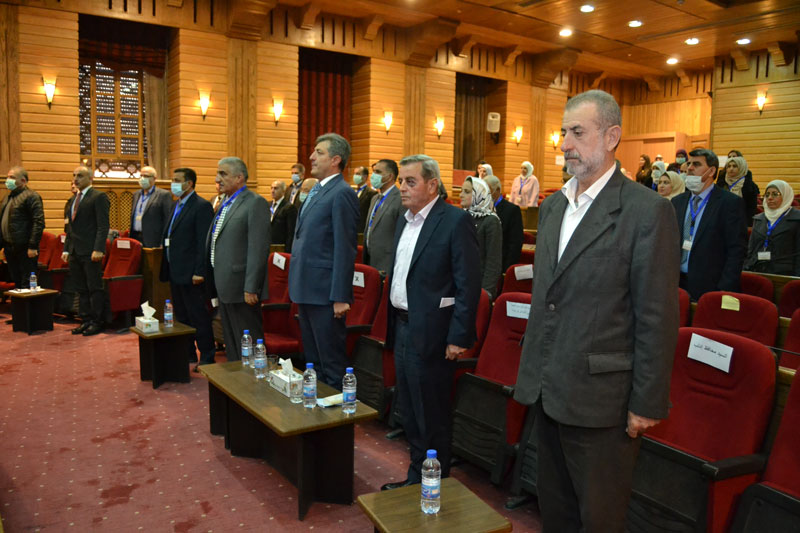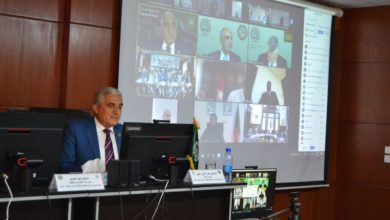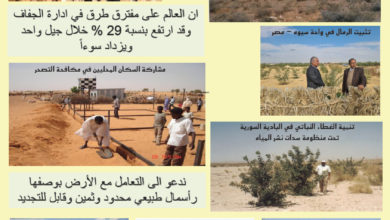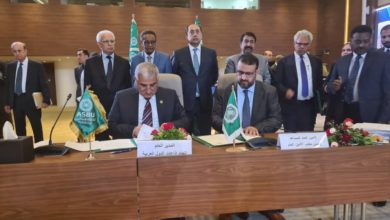Workshop in Hama on conservation agriculture and food security
The activities of the workshop on ” Conservation Agriculture and Food Security” were opened in Hama, Syria, today, in cooperation with the Ministry of Local Administration and the Environment, and the Arab Center for the Studies of Arid Zones and Drylands (ACSAD) for the benefit of seventy-five agricultural engineers from the ministries of Local Administration and the Environment, and Agriculture and Agrarian Reform, working in the two ministries’ departments from the governorates of Hama, Homs, and Idlib.
Dr. Nasr Edin Obaid confirmed, in the Governor of Hama’s presence, Mr. Mohamed Tarek Ziad Kraishati, Mr. Mohamed Natouf, Governor of Idlib, and Eng. Hassan Junaidan, representative of the Ministry of Local Administration and the Environment, that this workshop comes within the technical and scientific activities of the cooperation between ACSAD and the Ministry of Local Administration and the Environment, particularly in the implementation of the regional program to combat desertification, and participating in the preparation of neutralizing the effects of land degradation program and other projects.
He clarified that the high population increase in the Arab region led to an increase in food products’ demand. The deterioration of agricultural land due to the agricultural intensification and scarcity of freshwater resources have sparked fundamental changes in the traditional agriculture production system by new, less consuming systems to the natural resources that protect agricultural soils from wind and water erosion. The conservation agriculture system’s application is essentially based on three components: zero tillage, continuous soil coverage, and the application of the appropriate crop rotation.
The Director-General of ACSAD pointed out that the conservation agriculture system’s application has improved the productivity of all crops grown with grain and legumes, increased rainwater use efficiency, and reduced agricultural production costs compared with traditional agriculture. Also, pointing out that this system’s application in farmers’ fields in Syria compared with traditional agriculture has led to an increase in the average grain yield productivity, reducing fuel consumption, reducing the amount of planting seeds, reducing agricultural production costs, and improving water soil content.
At the end of his speech, Dr. Nasr Edin Obaid expressed his appreciation to Hama’s governor for hosting this workshop and to Idlib’s governor for his participation in this workshop. He confirmed that ACSAD is ready to develop cooperation with all relevant institutions to raise citizens’ standard of living and achieve comprehensive economic development for the beloved Syria that deserves to be given the souls and valuable things. We must give it our lives to keep the shadows deep in history, reaching to a future that she will be in over the years.
The workshop comes within the framework of the implementation of the activities of the project “for preparing Strategy Development for addressing Land degradation and Desertification problems resulting from the War on Syria using National indicators for Land degradation,” implemented by the Arab Center (ACSAD), in cooperation with the Syrian Ministry of Local Administration and the Environment, in the context of the cooperation agreement signed between the two sides on 18/7/2018. In support of national efforts to achieve food security and self-sufficiency in the Syrian Arab Republic, and deriving a set of recommendations, emphasize the importance of expanding the conservation agriculture system as an alternative agricultural system consistent with the concept of sustainable agricultural development.
The three-day scientific applied program of the workshop includes several axes, including the main components of the conservation agriculture system, its main success foundations, the conservation agriculture’s benefits, the positive reasons for the adoption of this system by farmers, the economic benefits for farmers from its application, the most important economic and social hindrance to its spread, and the factors impeding the possibility of adopting the technology of the conservation agriculture, in addition to the points to be taken into account before starting the application for the system of conservation agriculture, and the most important results of the implementing of the conservation agriculture system in the Syrian Arab Republic.
The workshop program also includes a field day in Al-Salamia in Hama governorate to witness the conservation agriculture activities in the governorate, in the presence of all participants and a group of farmers.




